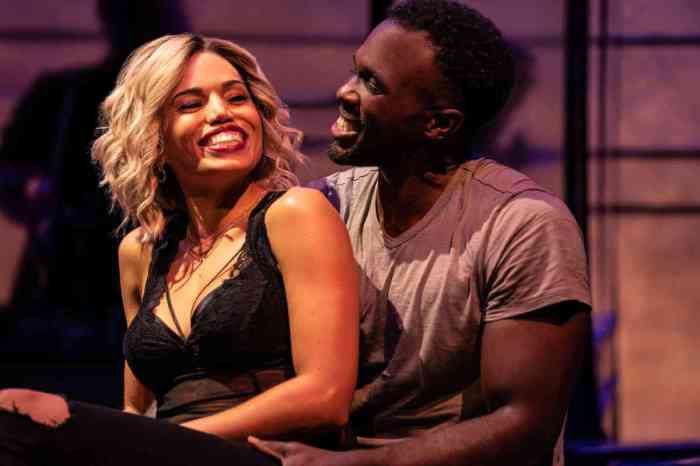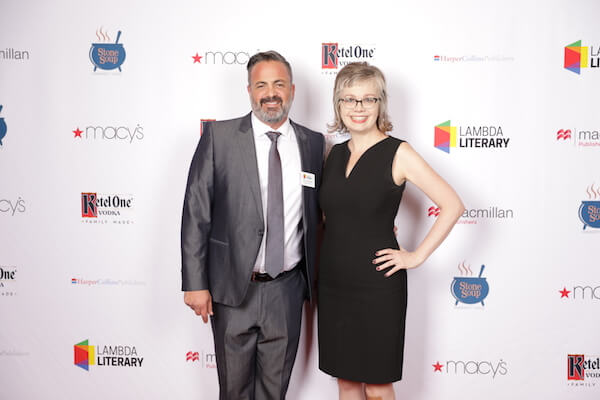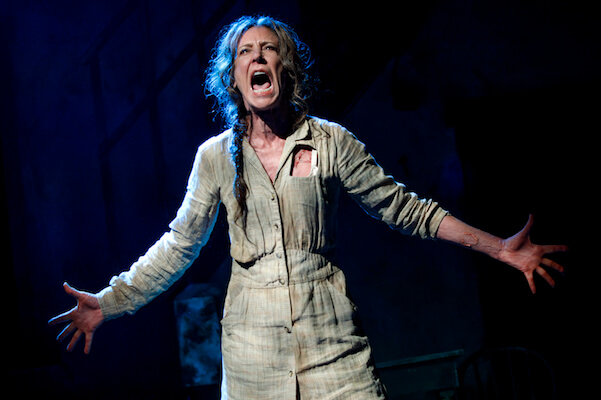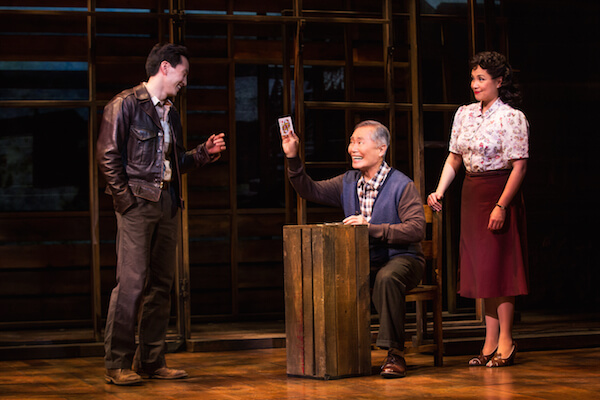Emmy-nominated whiz kid choreographer Travis Wall takes the next big step. | MICHAEL SHIREY
“Bare,” the topical, edgy rock musical about two Catholic boarding school dudes in love, has had well over 100 productions since it premiered in LA in 2000, amassing a rabid cult following. And now it’s back in New York in a vibrant, retooled version playing at The New World Stages.
With music by Damon Intrabartolo and book and lyrics by Jon Hartmere (Hartmere and Lynne Shankel added more songs), this Off Broadway “revisal” boasts an exuberant young cast portraying a group of angst-ridden, hormone-ravaged teens grappling with issues of faith, self-expression, sexuality, and bullying. The undercover lovers are played by Jason Hite and Taylor Trensch.
And who better to preside over this endeavor than Stafford Arima, the openly gay director of other teen-centric shows such as “Carrie” and “Altar Boyz.”
Travis Wall. | BOBBY QUILLARD
Arima was wise to recruit the supremely gifted choreographer Travis Wall, a young, tattooed dynamo nominated for an Emmy for his work with “So You Think You Can Dance.” In fact, their initial meeting was captured, somewhat awkwardly, in the surprisingly watchable yet little seen — it was on the Oxygen network — reality series “All The Right Moves,” which chronicled the rising star’s efforts to launch his dance company, Shaping Sound. He was also a choreographer for the visually stunning film “Step Up Revolution.”
Gay City News recently caught up with an overworked yet spunky Wall in a rehearsal room near Times Square to discuss “Bare” and his explosive career. Following are excerpts from the conversation.
DAVID KENNERLEY: First off, I must confess I’m a huge fan. What drew you from LA to Off Broadway with the “Bare” project?
TRAVIS WALL: The producers saw a piece I did on “So You Think” — it was a boy duet about best friends breaking up — and they invited me to a reading of “Bare.” I had no idea what I was getting myself into and I showed up completely open-eyed and open-eared. I was blown away, crying and crying, because the story is so close to what I went through coming out about five years ago. I felt like Jon Hartmere had been following me around with a pen, writing about my life.
Thank God I had dancing and choreography to escape those feelings. I have so much to pull from my experience. I think I’m the right person to tell this story.
DK: What’s it like doing your first show Off Broadway?
TW: I got to New York a few weeks ago and was thrown headfirst into the project — it’s so intense. I’ve never done a show like this before, working with actors and singers, not just dancers. The experience has taught me so much, it’s like I’m going to school. I thought I’d be doing this a lot later in my life. I think I may have found a new career. I’m really enjoying this.
Travis Wall first appeared on Broadway at age 12.| BOBBY QUILLARD
DK: You can already tell after just a few weeks?
TW: Yep. I knew on the very first day. The work ethic is so different — it’s basically a scheduled 9-7 job. I love the consistency of it. In TV and film, there might be an 18-hour day or a two-hour day.
DK: Can you talk more about the connection you feel to the subject matter?
TW: I realized I was gay around 15 or 16. I was quiet about it at first and had a girlfriend at the time. I saw how gay kids were being bullied in my school and I didn’t like any of it. No one ever accused me of being gay, but I didn’t want to try to figure out who I was around these people who didn’t know who they were. I knew I was better than that. So I peaced the fuck out [laughs].
That’s what the kids are going through in this show. They can’t be themselves among the group they’re surrounded by. The show has such a strong message of tolerance. There’s a story to be told. It’s not just kick ball changes and sparkles.
DK: “Bare” is a musical with a conscience. You participated in an event for National Coming Out Day and the producers are partnering with the Human Rights Campaign and anti-bullying groups. How does it feel to be part of a show that enlightens as well as entertains?
Jason Hite and Taylor Trensch in “Bare.” | CHAD BATKA
TW: It’s awesome. “Bare” is a gay show — actually I wouldn’t say it’s a gay show; it’s an amazing love story that just happens to be with two boys. I want everyone to see the show — it’s not for one audience. It educates about the minefields kids can face in school these days. Why some have even committed suicide. It’s because kids are not being accepted.
We are also partnering with the Tyler Clementi Foundation. His suicide was just devastating. Coming out shouldn’t have to be that difficult, but the world makes it that difficult. The haters shouldn’t try to control us. Until the day we are fully supported, we have to shout and get noticed.
DK: We saw your boyfriend on “All The Right Moves.” Has he been supportive of your latest venture?
TW: Absolutely, he is with me here in New York. We’ve been together for a year and a half. He loves that I have a consistent schedule. He’s happy for me because I come home and I’m so excited about this job.
DK: In one episode you said you “fell for the wrong guys” when you were younger. Care to elaborate?
TW: Um [nervous laughter]… I used to fall for straight guys all the time. It’s twisted and my friends made fun of me. I thought I could help the guy come out of the closet, make them feel that being gay was okay. I was that support to a lot of guys. Some experimented and came out, and some did not. But I grew up. Now that I know how wonderful it is to be in a gay relationship, I will never do that again.
DK: As a choreographer for your own dance company, you’re used to calling the shots. What’s it like working with a director like Stafford Arima?
TW: My opinion is always heard in this process. The writer, the composer, the director, and myself — we all get together in one room and deconstruct the script. We don’t always agree, but we always reach a smart compromise. I really learned the show inside out. As a result, I know where every character is coming from, which is essential to choreographing the show.
DK: This is a reboot of an earlier production. How did you go about reinventing the choreography?
TW: We’ve added a whole new kind of vocabulary. There are no traditional dance numbers in the show. Not only do the characters express themselves using song, but they use movement as well. I’m exploring a whole new side of choreography I never knew existed. It’s movement, not dancing. None of this feels like “5, 6, 7, 8!”
The cast of “Bare.” | CHAD BATKA
DK: What’s it like working with performers who are not career dancers?
TW: I have to explain things a little differently, but these kids are extremely talented. The reason I say “kids” is because this is the first job where I walked in and felt like an old trash bag. I used to always be the youngest person in the studio and I prided myself on that. Now I feel like I’m old. And I just turned 25.
DK: “Bare” is a rock musical. Is that a stretch from your contemporary aesthetic?
TW: Everyone thinks I come from this contemporary background because that’s who I am as a dancer, but I’ve been trained in a variety of styles. What I’m really trained in is musicality. Different songs make you do different things. There are moments in the show that are really funny, so I’ve played with humor — comic timing is important. The show is so eclectic. It’s got aggressive rock sequences and contemporary ballads. There’s a hallucinatory drug scene. And a sassy “Dreamgirls” scene.
DK: What’s the biggest challenge working in musical theater?
TW: You spend so much time and sweat working on one section and it can be cut in a heartbeat. And then sometimes it can be brought back and you do it all over again. It can be overwhelming. But I’m learning, “that’s show business, kid.
DK: You were in “The Music Man” on Broadway when you were 12. What do you remember from that experience?
TW: Back then I was the fat kid doing back handsprings across the stage. It’s a whole other experience being on this side of the table. There is so much more work that goes into these shows than I realized.
I loved performing on Broadway. Yet after a year and a half into it, I wanted to do something new. It’s tough doing eight shows a week of the same thing. I realized I wanted to work behind the scenes. I prefer to choreograph something, make it happen, leave, do another job, and have that first one still running.
DK: How does choreographing for a stage musical compare to working in other media?
TW: With movies and TV it’s a little easier, because if there’s something you want to focus on, you can easily put a camera on it and zoom in. In a two-hour [stage] show, you have this huge blank canvas and you have to figure how to get the audience focused on the right moments. Every second is meticulously choreographed, whether cast members are moving or not. I even choreographed a sex scene.
DK: Do you feel “All The Right Moves” helped your career?
TW: The reason we did it was to put Shaping Sound on the map. But also I wanted to be a positive gay role model and portray two guys in a loving relationship. I’m a normal person and I’m gay. When I was growing up, there were hardly any out public figures or gay TV characters. And if there were, they were huge stereotypes. I couldn’t relate to them. I like sports, I play football, I do all these things. I wanted to break down stereotypes.
DK: Can we expect the show to return for another season?
TW: It was a crazy experience, filming 12 hours a day. Our lives were so busy, so stressful. I wasn’t sleeping. We finally had to kick the cameras out or we wouldn’t have a finished [Shaping Sound] show. I can’t say yet whether we will do a season two. If we do, a few things will have to change. I’m happy we did it, but I was happy when it was over.
DK: What’s next? Is Shaping Sound really going on tour?
TW: Yes, we’re doing a ten-city tour in the spring. New York will be on the schedule, at the Joyce Theater. I’m so excited to put this awesome dance spectacular together and hit it out of the ballpark. After that, we plan to return to Fire Island to perform for the annual DRA [Dancers Responding to AIDS] benefit.
DK: Any final thoughts?
TW: I’m so excited about “Bare” and I’m honored to be part of the process. It was so before its time. It can be difficult for me to watch because it takes me back to that dark place a few years ago. I felt so alone.
But it has touches of humor, as well. A show should make you laugh before it can make you cry. It’s a dramatic love story that dares to challenge. It will make you think, it will make you feel. And that’s what theater should be.
BARE THE MUSICAL | New World Stages | 340 W. 50th St. | Mon., Wed.-Sat. at 8 p.m.; Sun. at 7:30 p.m.; Sat. at 2:30 p.m.; Sun. at 3 p.m. | $89.75-$126.50 | telecharge.com or 212-239-6200
Travis Wall will host a post-show TalkOUT discussion following the December 6 performance. Tyler Clementi’s family will host a similar discussion following the December 12 performance, as will the cast of “Bare” on December 19.







































